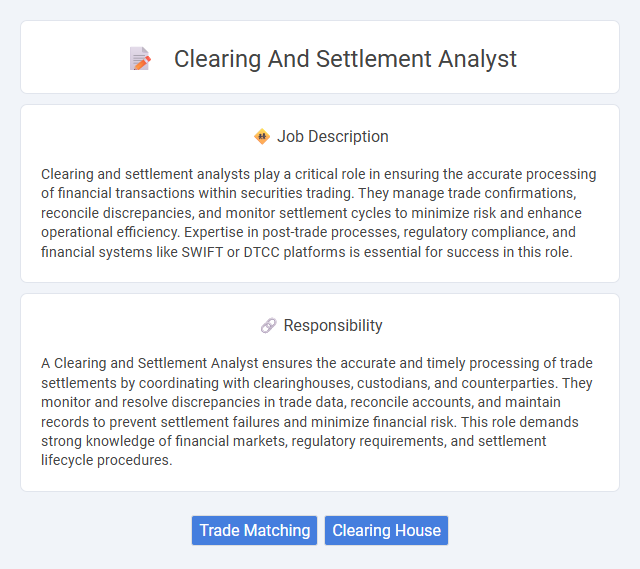
Clearing and settlement analysts play a critical role in ensuring the accurate processing of financial transactions within securities trading. They manage trade confirmations, reconcile discrepancies, and monitor settlement cycles to minimize risk and enhance operational efficiency. Expertise in post-trade processes, regulatory compliance, and financial systems like SWIFT or DTCC platforms is essential for success in this role.
People with strong attention to detail and an aptitude for working with complex financial data are likely to be suitable for a Clearing and Settlement Analyst role. Those who can remain calm under pressure and have good problem-solving skills may find the job aligns well with their abilities. Candidates who prefer repetitive tasks without much interpersonal interaction might not find it as fitting.
Qualification
A Clearing and Settlement Analyst typically requires a bachelor's degree in finance, economics, or a related field, combined with strong knowledge of financial markets and clearinghouse operations. Proficiency in risk management, trade reconciliation, and compliance with regulatory standards is crucial for ensuring accurate transaction processing. Advanced skills in data analysis, attention to detail, and experience with clearing systems such as DTCC or Euroclear enhance performance in this role.
Responsibility
A Clearing and Settlement Analyst ensures the accurate and timely processing of trade settlements by coordinating with clearinghouses, custodians, and counterparties. They monitor and resolve discrepancies in trade data, reconcile accounts, and maintain records to prevent settlement failures and minimize financial risk. This role demands strong knowledge of financial markets, regulatory requirements, and settlement lifecycle procedures.
Benefit
Clearing and settlement analyst roles likely offer benefits such as enhanced understanding of financial markets and improved risk management skills. Professionals in this position may experience increased job stability due to the essential nature of their function in transaction processing. Opportunities for career growth in financial services are also probable given the demand for expertise in clearing and settlement operations.
Challenge
Clearing and settlement analysts probably face challenges related to managing complex financial transactions accurately under tight deadlines. They likely need to resolve discrepancies that may arise during the clearing process, requiring strong analytical and problem-solving skills. Ensuring compliance with regulatory requirements while adapting to evolving market conditions might also present ongoing difficulties.
Career Advancement
Clearing and settlement analysts play a crucial role in ensuring the smooth processing of financial transactions and trade settlements, with opportunities to specialize in risk management or compliance to enhance career growth. Gaining expertise in regulatory frameworks, such as Dodd-Frank or EMIR, alongside mastering advanced settlement technologies like blockchain can significantly boost career advancement prospects. Progression often leads to senior roles in operations management, risk analysis, or strategic finance within investment banks, clearinghouses, and financial institutions.
Key Terms
Trade Matching
Clearing and settlement analysts specializing in trade matching ensure accurate reconciliation of trade details between counterparties, reducing discrepancies and operational risks. They utilize advanced trade matching systems and financial software to verify transaction data aligns with regulatory standards and internal compliance requirements. Their expertise enhances the efficiency of post-trade processes, contributing to timely trade settlement and improved financial market integrity.
Clearing House
Clearing and settlement analysts specialize in managing the post-trade processes within Clearing Houses, ensuring that financial transactions are accurately matched, confirmed, and settled. They monitor risk management protocols and maintain compliance with regulatory standards to facilitate the seamless transfer of securities and funds between market participants. Expertise in clearing systems, settlement cycles, and reconciliation enhances operational efficiency and reduces counterparty risk in financial markets.
 kuljobs.com
kuljobs.com